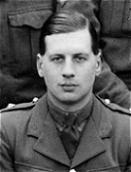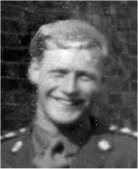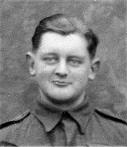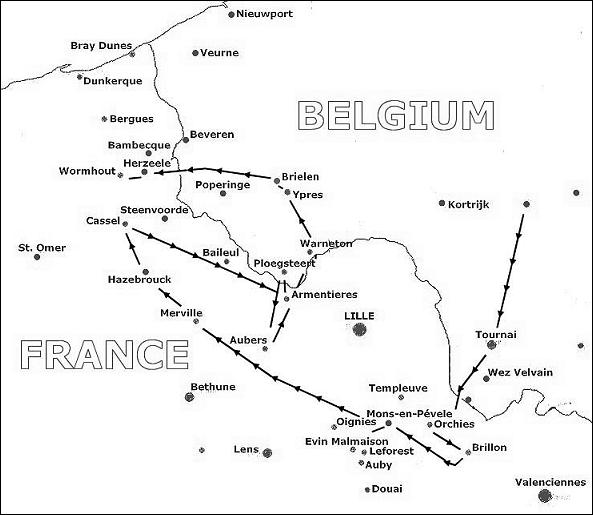Dunkirk - Carrier Platoon, 8th Battalion Worcestershire Regiment
The following account of Carrier Platoon's withdrawal to Dunkirk is given by 2nd Lieutenant (later Captain) E. W. B. Berry, M.C.
Lieut. E. W. B. Berry |
Owing to the amount of traffic on the road, the Carrier Platoon soon became separated from the remainder of our column, but as we had our rendezvous - ASEGHEN - we proceeded independently to that town. After searching the neighbourhood for the Battalion I learnt from the Divisional H.Q. in ASEGHEN that the 144 Brigade was somewhere in the region of TOURNAI, and so continued our journey in that direction. 2nd Lieutenant John Moore passed us on the way and arranged a R.V. at WEZ VELVAIN, south of TOURNAI. By the time we arrived in TOURNAI we found the forces there withdrawing and the last bridges blown. A decision had to be made then whether to continue or withdraw with the remainder as, owing to this unforeseen turn of events, it would mean we should probably be between the German and English forces. |
2/Lieut. John Moore |
I visited the local Brigade H.Q. and learnt that everyone was withdrawing towards ORCHIES and as no one could give me any information about our Brigade, I decided to withdraw to ORCHIES and then if the Battalion had not withdrawn as far, return to them from there.
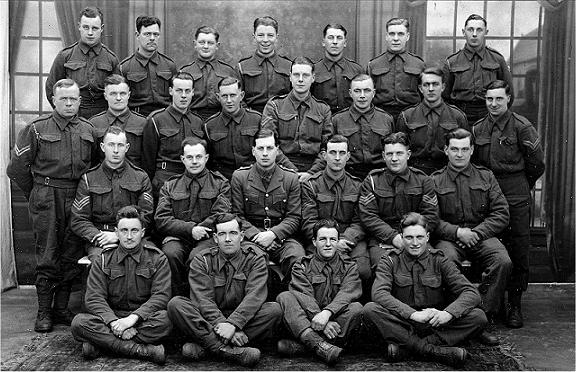
Carrier Platoon - 8th Battalion Worcestershire Regiment (Le Forest, France - May 1940)
Front row: Pte. ????, Pte. ????, Pte. Pickering, Pte. ????
2nd row (seated): Sgt. ????, Sgt. Bethell, 2/Lieut. E. W. B. Berry, Sgt. Spragg, Sgt. ????, L/Cpl. ????
3rd row: Cpl. Samson, Pte. Reid, Pte. Watson. Pte. ????, Cpl. Darby, Pte. Bentley, Pte. ????, Cpl. Gwilliam
Back row: Pte. ????, Pte. Lowe, Cpl. P. Huxter, Cpl. W. Griffen, Pte. ????, Pte. ????, Pte. ????
On our way to ORCHIES the last 2 carriers mistook the turning and we arrived there with 7 machines. Here we were told to report at TEMPLEUVE, but, at that moment, the G.S.O.1 of the "MAC Force" saw the platoon and being in need of some carriers sent us to be attached to the 5th Manchesters at BRILLON, the idea being that if the Germans had broken through as far south, we were to help deal with any A.F.V's in our rear.
After two days with this Battalion during which time we did a certain amount of patrolling, I received orders to report to the 138 Brigade at LA VACQUERIE FARM, MONS EN PEVELE. It should be mentioned here that besides the normal crew we had 11 O.R's belonging to various Rifle Companies, 1 extra Bren Gun and several additional Anti-Tank Rifles which had been loaded on at ASPELAERE.
The 11 O.R's and the Bren Gun were left for protection for Brigade H.Q. and the Brigadier told me to take one section to the Sherwood Foresters at EVIN MALMAISON and the other section to the Yorks and Lance at OIGNIES. This Brigade was defending the canal against the German Force South of DOUAI.
Both of these Battalions were very pleased to see us as, apart from Rifles, the only arms they had were 18 Bren Guns and a few Anti-Tank rifles, per Battalion.
We remained in this area for about two days when the Yorks & Lancs together with the Carrier Platoon were ordered to proceed to MERVILLE. That day, OIGNIES was heavily bombed by enemy aircraft in raids lasting from about 10 a.m. to 3 p.m. We arrived in MERVILLE that night and the next morning we were ordered to proceed to CASSEL. Unfortunately, the gear lever on one carrier had broken and as we were told to expect action, we had to leave it behind, reducing the platoon to 6 machines.
On the way to CASSEL the last machine with Cpl. Huxter in charge had engine trouble and was unable to find us when the trouble had been overcome, this depleting the Platoon to 5 machines.
When we arrived at CASSEL we found the R.I.A.S.C. Muleteers just moving out to DUNKERQUE and the Chateau grounds we took over from them had been bombed or shelled and 18 horses and mules killed. The English N.C.O. in charge also handed over a meal they had cooked of chicken and bread and butter which was very acceptable as we had not had anything to eat, except a few biscuits, for two days.
Soon after our arrival the Village was bombed, but the platoon suffered no casualties. After that we had a day and a half of comparative peace until 145 Brigade arrived and the 2nd Glosters decided they liked our Chateau Grounds. Troops were rather thick on the grounds, so I decided to join Battalion H.Q. in another Chateau about 1 mile further down the road.
About lunch time that day the Battalion was ordered to proceed towards WORMHOUDT but although I had made repeated efforts to try to trace our Battalion it seemed that definite steps must be taken now. I received permission to report to G.H.Q. The "MAC FORCE" which was in CASSEL and eventually found out that the Brigade was in the area LA BASSEE - FOURNES. The information was rather vague but we left CASSEL at 1 p.m. and proceeded through BAILEUL to ARMENTIERES. Here I enquired of 1 Corps. H.Q. and learned that we now belonged to 3 Corps. and told to report to their H.Q. at PLOGGSTEERT. 3 Corps. told us that 144 Brigade were at AUBERS but were thought to be moving that night. We arrived at AUBERS about 5.30 p.m. and found it empty. Luckily we noticed some officers in a house up an alleyway and found the C.R.A. (Brigadier Lawson) and some of his staff who told us the the Brigade had left that morning for DUNKERQUE. This was rather a blow because when we came to check up, we found one machine had only ¾ gallon of petrol left and the remainder averaged about 2 gallons. The food question did not worry us as by now each machine had collected a store, no meals having been issued for 3 days. |
|
After travelling about 5 miles, we found a French Petrol Column and obtained about 20 galls off them. The route we were taking was ARMENTIERES – YPRES – FURNES - DUNKERQUE.
ARMENTIERES was heavily bombed that day and every town we went through we seemed to have just missed the raids.
This time, going through the city, we had to make a detour and got mixed up with a large column of buses taking Belgian soldiers northward. These vehicles did not seem to be concerned about aerial activity as they were moving in solid formation. I signalled to the other carriers to drop back and let the column get out of sight.
We then found that we were heading for WARNETON and so cut across towards MESSINES but eventually joined the column of buses again at ST. ELOI. They halted in YPRES and we proceeded towards FURNES.
Petrol was now beginning to run rather short and I attempted to get some from a Battalion in BRIELEN but they were already short and the petrol point was 10 miles away off my route. I decided to push on as we had sufficient for about 30 miles. Eventually we found an RASC Troop Carrying Company and they gave us 8 galls per machine. To reach them we had to go up a long track through orchards and apparently we quite unwittingly created a "stir" as they thought we were German AFV's and everyone had "gone to earth".
Travelling was now naturally slower as it was a very dark night (about 10 p.m.) but to avoid any air attack during the day I decided to get as far as possible under cover of darkness. To make things more difficult between FURNES and DUNKERQUE there was a solid line of French horse transport, but there was an air raid over the town and the light reflected from the searchlights helped considerably. Our entry into DUNKERQUE was no so impressive as in most towns, in fact it was rather difficult to get in at all - the road was jammed full with English and French transport.
We were unable to get any useful information so we parked the machines in a small side street and having arranged for a sentry or look-out, the crews slept in their machines. The time was than about 2 a.m. and at about 6 a.m. we moved. I found a park and the machines took cover under the trees whilst I went to make enquiries.
The Town Major was unable to help me nor were two subalterns, I turned out of bed in a hotel, (I thought they belonged to Divional Staff). I finished by tracking down the Area Commandant and learnt from him the Divisional H.Q. were at BERGUES.
In the meantime, the crews had found a Y.M.C.A. Mobile Canteen which was giving them a cup of tea, 2 bars of chocolate and 20 cigarettes free. This was all extremely welcome as money was non-existent with a lot (including the Platoon Commander !!) and we had not had a cup of tea for several days.
We proceeded to BERGUES and learnt that the 144 Brigade were in the area of WORMHOUDT. We continued our journey until in HERZEELE, 2/Lt. Moore saw us and told us that "B" Echelon were in the village and we rejoined our Battalion at about 10 a.m. after being posted as "Missing." The day before we had of course been within about 10 miles at CASSEL.
Withdrawal route taken by the Carrier Platoon - 8th Battalion Worcestershire Regiment |
On the 29th May 1940 the 8th Battalion had to fight a rear guard action at Bambecque. Orders had been received to hold Bambecque until 21.00 hours that day. "B" Company took up a position north of the River Yser covering the road from Herzele and "C" company were just west of the village itself. Battalion H.Q. was in the village. By 11.30 hours that day "D" company had successfully withdrawn half a mile to the east on to the road from Bambecque to West Cappel. The Germans were now coming in large numbers from Wormhoudt in the south-west and Bergues in the north-west. By 17.00 hours an enemy tank attack had closed in on "D" Company H.Q. and set it on fire. "A" Company were also near "D" Company. Both these companies were badly shot-up by the Germans and could hold their positions no longer. The survivors made their way back to Battalion H.Q. By 17.30 hours the Germans were closing in around Bambecque and "B" and "C" Companies were heavily involved. Captain E. W Berry organised a working party and built a very strong road-block of farm carts and tractors on the Bambecque road below Battalion H.Q. Earlier Captain Berry was also involved in a shoot-out with Germans in Wormhoudt market square forcing the Germans to retreat into the houses. |
At 18.00 hours orders had been received from the Brigade for the Battalion to withdraw at 21.00 hours to Bray Dunes, on the coast north-east of Dunkirk. As darkness fell the companies began to withdraw. The last detachments left at about 22.00 hours under the command of Captain Berry. But "B" and "C" Companies had suffered grievous loss. In fact "B" Company had fought on until its ammunition was exhausted and finally had no choice but to surrender to the Germans.
Note: Captain Berry was awarded the Military Cross as a result of his heroism during the above actions.
After Dunkirk Captain Berry was posted to Collumpton and then Falmouth , before training in Lincolnshire. He ended the war as a liaison officer in Crete and then Greece. He reached the rank of major and was awarded the Territotial Decoration (T.D.).

